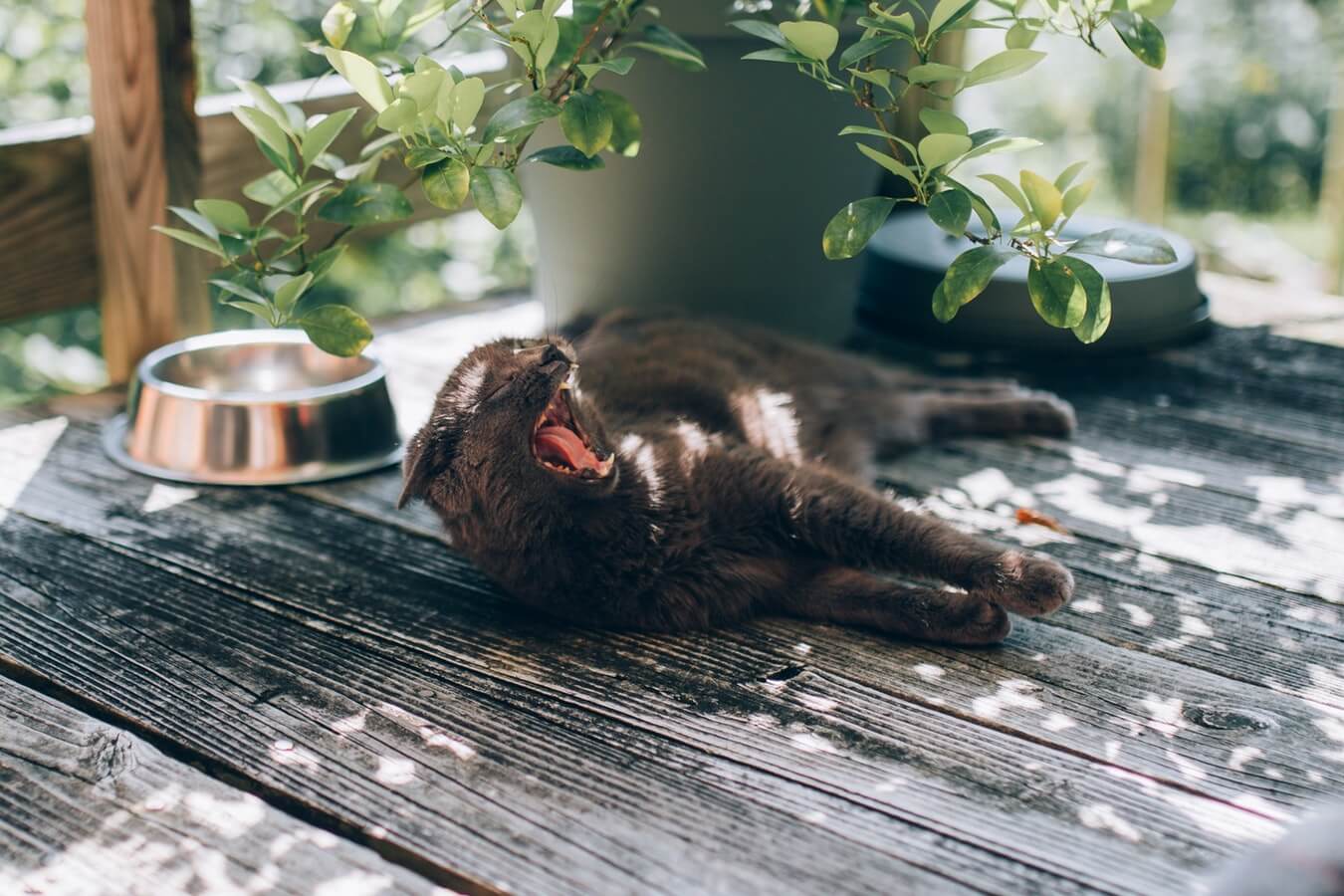
People sweat to cool off. Cats, like human beings, have sweat glands. They are mostly covered up under their fur. The ones present under their fur does not provide enough cooling because sweat will be lost within the fur. The only place on their body with any exposed sweat glands in their paws.
Since their paws have a tiny surface area, they have adapted to other perspiration strategies to help them shed the excess water and deal with the heat. Cats do perspire, just not in the ordinary sense. All animal’s body temperature is controlled by the brain. When they are hot, the body sends signals to the brain to disperse this body heat. The animal then applies mechanisms to cool itself off.
Table of Contents
Why Are Cats Sweat
They are hot Most of a cat’s body is concealed in fur. It is, therefore, hard to notice if and when they do secrete water. Increased temperatures can get them uncomfortable. When they are hot, they will most definitely sweat through their paws. The first clue that your cat may be hot is that they will be drinking more water than usual.
Cats barely drink that much water. You might notice that your pet is leaving drops of water as he/she walks about. This should not alarm you, it is not pee. When it is very hot, they tend to lose a lot of water through their paws to cool off. They secrete this sweat on their paw pads an in between their toes. The great thing is that their sweat is pretty much odorless.
This little moisture is however not sufficient enough to cool cats off when they’re hot. They also don’t perspire as often as human beings do. For this reason, they make other choices regarding cooling themselves off during hot weather.
You May Also Interested In: Do Cats Drink Water?
Cool Down
Cats “sweat” in other unconventional ways when they are hot. You may have noticed your pet licking himself/herself every other day. This activity can be done more frequently when it’s too hot. Since water cannot really escape their fur, they lick themselves. The saliva evaporates instantly cooling the animal. Most of them shed a lot of fur during hot months. This helps them increased the surface area of exposed skin to help them cool off.
They could also pant to cool themselves down. Panting allows heat from their overheating bodies to escape through moisture in the mouth, tongue, and throat. The cat exhales this moisture and cools off through evaporation. They also shade themselves in low heat spots to maintain cool temperatures.
This will reduce the amount of heat their bodies are exposed to, therefore, cooling them off. Cats lie down and stretch their bodies out on cold surfaces to get their skin feeling cold. When they reach temperatures above 102 F, they could begin to overheat.
Signs that your feline friend might be feeling too hot are;
- Restlessness
- Vomiting
- Diarrhea
- Seizures
- Increased shedding
- Lethargy
- Moist feet
- Trembling
- Disorientation
- Staggering
- Purple gums
Overheating can lead to heat stroke, organ failure, brain swelling, blood clots and in server cases death. Because cats don’t perspire that much by themselves, you could help them cool off. This is especially important to reduce heat exhaustion. You could;
- make them a pet fountain using running tap water
- pat your pet with a wet flannel
- wrap them in a blanket with a water bottle filled with iced water
- Hand them water with ice cubes to drink and “play” with.
- Direct a fan or AC unit towards them
- Keep them indoors
- If your feline friend seems to be exerting signs of hyperthermia, contact a veterinary doctor immediately.
They Are Frightened
Cats have also been seen to sweat when they are frightened or anxious. When you take your pet to the vet, they may instinctively become agitated and even scared. They sweat excessively when scared and leave a wet paw print as they move.
Some people may think that cats panting is a healthy way of sweating. Unlike dogs, it is quite rare for them to pant. They not only pant to cool off but also to express fear and anxiety. A combination of panting and sweating through their paws could indicate that your pet is frightened and uncomfortable. You should try a much as possible to help them feel more at home.
Cats may in some cases begin to perspire when they feel stressed out. If perspiration through the paws is accompanied by; overgrooming, excessive scratching, excessive spraying, hiding and sleeping under the bed, then your pet might be stressed out.
They May Be Secreting Pheromones
Pheromones are chemical signals that are sent through the air to create an emotional effect on the member of the opposite sex from the same species. Cats secrete pheromones through perspiration glands, found on their paws. Those that are secreting pheromones might be showing other symptoms apart from sweating. They will have increased heart rate, dilated pupils and a release of scents through the scent glands in their paws.
They Are Excessively Active
When cats are excessively active and overexcited, their temperature can increase. This is similar to what human beings experience when they run or do some extensive cardio. After a session of running around chasing bugs and yarn, they will start to perspire.
They do this to release tension and cool off to accumulate more strength for running around. Most of them sweat through panting after vigorous exercise.
Conclusion
Cats sweat for a variety of reasons. Perspiration brings a cooler atmosphere and can release stress and reduce illness to your pets. It may also be a sign that something is wrong with your feline companion. In this case, act accordingly and quickly try and fix the problem.
Some tips to help guard pets against negative sweating are;
- Never leave your pet inside a hot car by themselves.
- Don’t leave them inside a hot room without any ventilation.
- Never leave them alone in rooms where they may face potential heat danger, i.e., in a room with an open dryer.
Share this:
- Click to share on Twitter (Opens in new window)
- Click to share on Facebook (Opens in new window)
- Click to share on Tumblr (Opens in new window)
- Click to share on Pinterest (Opens in new window)
- Click to share on Reddit (Opens in new window)
- Click to share on Telegram (Opens in new window)
- Click to share on WhatsApp (Opens in new window)
- Click to print (Opens in new window)
